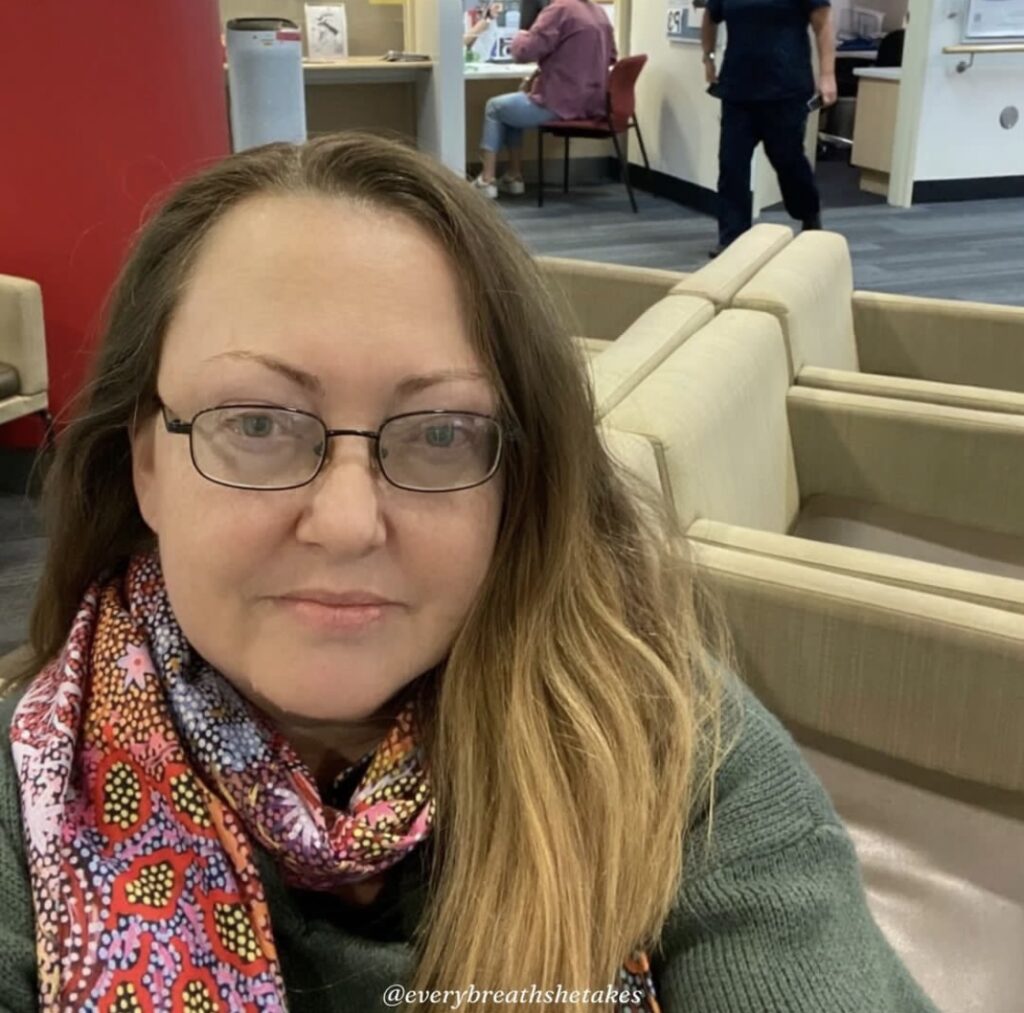Living with Idiopathic pulmonary fibrosis, or IPF, the story of Anita outlines her life with the progressive disease that causes lung tissue to become thickened and scarred. IPF is a disease that affects patients in many aspects of their lives, and there is no cure.
Anita, 46 from Queensland, was diagnosed with IPF and Chronic hypersensitivity pneumonitis (CHP) in 2017, after seven years seeking answers. Initially diagnosed with whooping cough and pneumonia in 2010, basic activities became difficult due to an incessant cough. She and her family kept researching, and despite IPF being dismissed by her first specialist in Cairns, they were persistent and sought second opinions. Dr Simon Bowler in Brisbane confirmed their suspicions and Anita was diagnosed with IPF and CHP through a biopsy.
Anita, from Queensland, shares her journey living with IPF and CHP. While a diagnosis of pulmonary fibrosis can feel isolating, she wants you to know you are not alone.

What happened once you received your diagnosis?
The diagnosis came with a devastating prognosis of 6-12 months to live. Shattered, I spiralled into depression and anger towards my previous doctor. Chemotherapy proved ineffective, prompting Dr Bowler to escalate my case to the transplant team.
Activities that once brought me joy were restricted due to living with IPF. Gardening, hiking, playing sports, travelling, and creative pursuits all posed challenges. Even renovating homes, a former passion, had to take a back seat.
How did you learn about lung transplantation?
Introduced by Professor Peter Hopkins, I began researching lung transplantation and organ donation. After an extensive interview and pre-assessment, I was placed on the transplant waiting list in June 2018. The wait was expected to be long due to my need for a small or one large lung.
In October 2018, severe pneumonia landed me back in the ICU, close to life support. Miraculously, I recovered, and this experience sparked a profound spiritual shift. In December, a call came about a possible lung match, but expectations were low. Nonetheless, I was instructed to prepare for surgery.
How was the lung transplant for you?
The situation was surreal, with mixed feelings of hope and apprehension. Before heading to the hospital, I made sure to see my four children, giving them hugs and expressing my love. The initial uncertainty was replaced by confirmation that the lungs were indeed a good match, and surgery was imminent.
Waking up in the ICU the next day, I was flooded with emotions. Gratitude for the gift of new lungs mingled with the sobering realisation of the donor’s sacrifice. Complications arose in the form of Gastroparesis, requiring a feeding tube. Additionally, I discovered allergies to some anti-rejection medications.
Determined to be home for Christmas, I pushed myself through exercise and physio, even making a deal with Dr Andreas Fiene for early discharge if I met all requirements. On Christmas Eve, my wish was granted. Arriving home late that night, I was able to surprise my family and share the joy of the holiday season.
How was the first-year post lung transplant?
The first-year post-transplant living with IPF was challenging, with complications including blood issues, high blood pressure, and rejection episodes. However, the precious gift of extended life allowed me to create more memories with my children.
In the years since, various health issues have emerged, including sleep apnoea, high blood pressure, reduced kidney function, shingles etc. But these challenges pale in comparison to the joy of being alive. I remain a busy mother of four, filled with a newfound appreciation for life.
This second chance has transformed my perspective, igniting a curiosity about the world. I notice details I previously overlooked and have developed a passion for helping others through sharing my experiences online. Educating and advocating for research into lung conditions has become my mission.
This is my journey – one of resilience, gratitude, and a commitment to making a difference in the lives of others.
What Lung Foundation Australia support services have you accessed, and what impact has this had?
Through the support services offered by Lung Foundation Australia, I was able to navigate the complexities of my condition, access crucial information, and advocate for my own health with confidence. My experience underscores the invaluable role that organisations like Lung Foundation Australia play in empowering individuals facing respiratory challenges, providing a beacon of knowledge and support in the face of uncertainty and misdiagnosis.
I attended pulmonary rehabilitation classes not once but twice. This was a crucial part of my pre-listing process. Additionally, I still participate in Lung in Action classes to this day, which has been incredibly beneficial in maintaining my lung health post-transplant, and interacting with the other members has been a valuable source of support and camaraderie.
What has been most challenging for you living with IPF?
IPF isn’t just a diagnosis; it’s a life-altering condition that turned my world upside down. Simple tasks that I once took for granted became monumental challenges. My energy levels plummeted, leaving me exhausted after the smallest exertion. Walking my dog, socialising with friends, even just holding a conversation – all became difficult.
How was the impact of IPF on your family?
IPF didn’t just affect me; it changed my entire family’s life. My husband had to take on more responsibilities, from managing household chores and errands to caring for our children. Our daily routines became a delicate balancing act. We had to let go of many activities we once enjoyed together, like gardening and traveling.
Despite the hardships, I’ve learned to adapt to this new reality. I’ve sought support from my family, friends, and healthcare providers. I’ve explored alternative therapies to manage my symptoms and improve my quality of life. And now, after receiving a lung transplant, my life is completely different.
For someone living with IPF, what hope do you have for them?
Living with IPF is undeniably difficult, but it’s not impossible. While the disease presents challenges, there are ways to manage symptoms, adapt to limitations, and find support. If you’re facing this diagnosis, remember that you’re not alone. Reach out to your loved ones, seek professional guidance, and never give up hope.
Advocate for yourself, don’t be afraid to ask questions or seek second opinions. Surround yourself with family, friends, or support groups who understand your journey and can offer emotional support. Prioritise mental health as living with a chronic illness can take a toll on your mental well-being. Seek therapy or counselling if needed, and practice self-care techniques like meditation or journaling.
Research your condition, connect with online communities, and participate in lung health advocacy groups. Learning from others and sharing experiences can be incredibly valuable.
What is your hope for the future?
Driven by a fervent desire to pay forward the gift of life I have received, I have dedicated myself to sharing my journey, insights, and knowledge about lung conditions, transplantation, and recovery with others.
In pursuit of my passion for supporting others on their medical journeys, I am currently pursuing studies in art therapy, with the vision of one day offering these healing services to fellow transplant recipients and individuals navigating similar challenges.
Lung Foundation Australia, in partnership with the Centre of Research Excellence in Pulmonary Fibrosis, are here to provide you with the tools and information you need to live well with your condition. Download our free resource pack to access evidence-based resources, connection to a community of others who understand what you’re going through, and updates on clinical trials and research.

